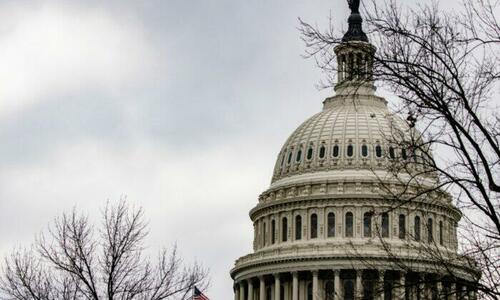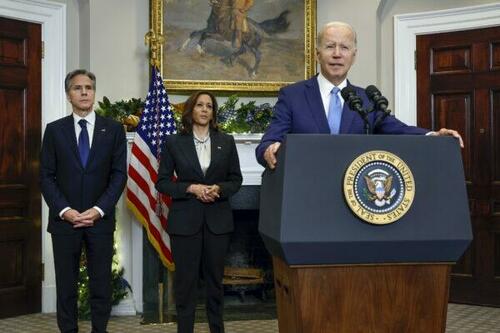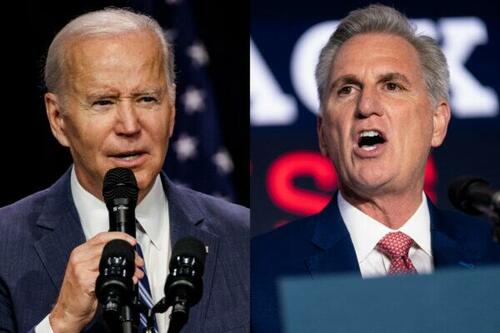
Authored by Joseph Lord via The Epoch Times (emphasis ours),
The House of Representatives just passed the mammoth $858 billion National Defense Authorization Act (NDAA), an annual must-pass bill setting out defense spending levels.
See what’s inside, and what was left out, below.

Military Vaccine Mandate Repealed
In a major win for Republicans and critics of President Joe Biden’s COVID-19 policies, this year’s iteration of the NDAA will include a repeal of a vaccine mandate for military service members.
Biden announced in August 2021 that all federal employees, including military service members, would be required to take the COVID-19 vaccine or lose their job, despite a dearth of long-term testing on the vaccine.

Republicans were opposed to the mandate from the beginning, calling it a violation of the personal liberty of citizens to make their own health decisions.
Initially, service members who refused the vaccine were liable to face consequences up to and including court martial and dishonorable discharge. A dishonorable discharge, roughly the military equivalent of a felony conviction, can severely impact a service member’s life, as many employers will not even consider hiring someone with a less-than-honorable military discharge.
Last year, the Senate passed a draft of the NDAA barring the Department of Defense (DOD) from dishonorably discharging service members solely for refusal to take the vaccine.
However, the mandate remained in effect. Even after Biden boldly declared that “the pandemic is over,” the Pentagon refused to budge on its vaccine requirements.
But in the past several weeks, efforts to repeal the mandate once and for all ramped up among Republicans.
After rumors began circulating that the NDAA would undo the mandate, House Minority Leader Kevin McCarthy (R-Calif.)—the frontrunner in the race for the speakership of the 118th Congress—vowed during an appearance on Fox Business Network’s “Sunday Morning Futures” that his caucus would not pass the bill unless it ended the vaccine mandate.
“We will secure lifting that vaccine mandate on our military because what we’re finding is, they’re kicking out men and women that have been serving,” McCarthy said. “That’s the first victory of having a Republican majority, and we’d like to have more of those victories, and we should start moving those now.”
Democrats yielded on the issue, giving Republicans a major policy win.
The passage of the bill through the lower chamber came just days after Defense Secretary Lloyd Austin expressed his desire to continue imposing the mandate.
“We lost a million people to this virus,” Austin told reporters, although studies and data have shown the vast majority of people who died from COVID-19 were elderly or have compromised immune systems. “A million people died in the United States of America. We lost hundreds in DOD. So this mandate has kept people healthy.”

Following the addition of the amendment ending the mandate, Sen. Rand Paul (R-Ky.), one of the most vocal critics of Biden’s diktat, applauded the outcome.
“This is a big day for our men and women in the military,” Paul said in a tweet. “We won, and the NDAA will be amended to respect medical autonomy and religious freedom.”
“These young men and women are willing to put their lives on the line, and now we’ve come forward to say they deserve to be treated with respect,” Paul said in a press conference.
Sen. Marsha Blackburn (R-Tenn.), another key proponent of the amendment, also applauded the bill as “a huge victory for our troops.”
No Reinstatement of Troops
Though the bill will undo Biden’s mandate, hopes that the bill would reinstate those who were kicked out of the military for refusal to take the vaccine did not come to fruition.
According to Defense Department data, 3,717 Marines, 1,816 soldiers, and 2,064 sailors have been discharged for refusing to get vaccinated against COVID-19, although a small portion has been allowed to remain in service owing to religious or medical waivers.
As of Dec. 1, over 11,500 members of the Army, Army National Guard, and Army Reserve have declined to get vaccinated against COVID-19, Axios reported, while 97 percent of the Army’s active personnel received the shot.
In an exclusive interview with The Epoch Times, Air Force Lt. Col Adam Conrad, who asked that his name be changed to protect him from retaliation by the DOD, said that he had “never seen morale so low” as it got after the imposition of the mandate.
Various military bodies have been struggling to meet their recruitment goals in part over the vaccine mandate, with the U.S. Army reaching just 75 percent of its recruitment goal of 60,000 for this year, according to Army Secretary Christine Wormuth.
Still, the NDAA will not reinstate those troops who were removed due to their opposition to taking the experimental vaccine.
In a statement after the passage of the bill, McCarthy applauded the end of the mandate and suggested that Republicans will continue to work to reinstate discharged service members when they take control of the lower chamber in January.

“The end of President Biden’s military COVID vaccine mandate is a victory for our military and for common sense,” McCarthy said. “Last week, I told the president directly: it’s time to end the COVID vaccine mandate and rehire our service members.”
“While I applaud the end of this onerous mandate—the Biden administration must go further. Unfortunately, the mandate has already had negative consequences for our military,” McCarthy said, citing the difficulties that the military has faced in recruiting.
“These heroes deserve justice now that the mandate is no more,” he continued. “The Biden administration must correct service records and not stand in the way of re-enlisting any service member discharged simply for not taking the COVID vaccine.
“Make no mistake: this is a win for our military. But in 28 days the real work begins—the new House Republican majority will work to finally hold the Biden administration accountable and assist the men and women in uniform who were unfairly targeted by this Administration.”
This may be a difficult promise to keep, however, as Democrats retain the upper chamber and will have substantial leverage over the House GOP majority.
Another Million-Dollar Dole to Ukraine
The bill will also grant another $800 million of taxpayer funds to the Ukraine Security Assistance Initiative as part of the U.S. effort to help Ukraine defend itself against an ongoing Russian invasion.
The United States has already sent around $68 billion in humanitarian and military assistance to Ukraine in three major packages.
The first aid package, passed as part of the $1.5 trillion omnibus spending bill for fiscal year (FY) 2022, sent Ukraine $13.6 billion. In May, Congress passed another standalone bill granting Ukraine $40 billion. Again in September, an additional $13.7 billion was sent to Ukraine.
Though the appropriation is smaller than past handouts, Americans are in the dark as to how exactly Ukraine is using the aid.
Alarmingly, reports indicate that weapons purchased with taxpayer funds have wound up as far afield as Nigeria, falling into the hands of terror groups.
President Muhammadu Buhari of Nigeria said during a summit of African leaders that “the raging war in Ukraine serve[s] as major sources of weapons and fighters that bolster the ranks of the terrorists in Lake Chad Region.”
He added, “A substantial proportion of the arms and ammunitions procured to execute the war in Libya, continues to find its way to the Lake Chad Region and other parts of the Sahel. Weapons being used for the war in Ukraine and Russia are equally beginning to filter to the region.”
Because of this, calls have escalated among Republicans for Ukraine’s use of taxpayer funds to be audited.
During a Dec. 9 hearing of the House Foreign Affairs Committee, a measure proposed by Rep. Marjorie Taylor Greene (R-Ga.) to audit the Eastern European nation was defeated by Democrats.
“The American people deserve full transparency and oversight of where their hard earned tax dollars have gone and that’s why we should audit Ukraine,” Greene said in a Twitter post after the vote.
“An audit isn’t pro or against Ukraine, it’s just the right thing to do.”
The $800 million figure is far short of the $37.7 billion in additional aid for Ukraine requested by the White House at the end of November.
Silence on Pentagon Abortion Policy
The bill does not address a policy recently announced by Defense Secretary Austin that would see taxpayer dollars used to fund travel costs for women in the military to get abortions.
The policy came in response to the Supreme Court’s decision in Dobbs v. Jackson Women’s Health Organization, in which the court overturned Roe v. Wade. As a result of this decision, the right to regulate abortions has been returned to state legislatures for the first time in nearly 50 years.
Austin argued that because military servicemembers often have to travel for work, they should not be restricted from getting an abortion if they are stationed in a state with more restrictive abortion laws.
“Our Service members and their families are often required to travel or move to meet our staffing, operational, and training requirements. Such moves should not limit their access to reproductive health care,” Austin wrote in an October memo.
He contended that the “practical effects of recent changes” would harm military readiness.
“In my judgment, such effects qualify as unusual, extraordinary, hardship, or emergency circumstances for Service members and their dependents and will interfere with our ability to recruit, retain, and maintain the readiness of a highly qualified force,” he wrote.
Republicans were quick to blast the decision.
Sen. Roger Marshall (R-Kansas) called it “outrageous,” and demanded that Senate Majority Leader Chuck Schumer (D-N.Y.) allow a vote on an amendment to prohibit it.
While the text of the bill does not actively give the green light to this policy, it also does not contain language prohibiting it.
The Pentagon is given a great deal of latitude on how it uses the funding granted by each year’s iteration of the NDAA. While large chunks of it are appropriated for specific purposes, a large proportion of these taxpayer dollars are left to the discretion of the Pentagon to spend as they will.
This means that, if the bill passes with no prohibition of the policy, taxpayers will find themselves indirectly footing the bill for abortions in contravention of an existing law known as the Hyde amendment, which restricts the use of federal funds for abortions.
Klobuchar Media Bill Fails
An effort by Sen. Amy Klobuchar (D-Minn.) to attach a controversial bill rider to the package was rejected.
Read more here...
Authored by Joseph Lord via The Epoch Times (emphasis ours),
The House of Representatives just passed the mammoth $858 billion National Defense Authorization Act (NDAA), an annual must-pass bill setting out defense spending levels.
See what’s inside, and what was left out, below.

Military Vaccine Mandate Repealed
In a major win for Republicans and critics of President Joe Biden’s COVID-19 policies, this year’s iteration of the NDAA will include a repeal of a vaccine mandate for military service members.
Biden announced in August 2021 that all federal employees, including military service members, would be required to take the COVID-19 vaccine or lose their job, despite a dearth of long-term testing on the vaccine.

Republicans were opposed to the mandate from the beginning, calling it a violation of the personal liberty of citizens to make their own health decisions.
Initially, service members who refused the vaccine were liable to face consequences up to and including court martial and dishonorable discharge. A dishonorable discharge, roughly the military equivalent of a felony conviction, can severely impact a service member’s life, as many employers will not even consider hiring someone with a less-than-honorable military discharge.
Last year, the Senate passed a draft of the NDAA barring the Department of Defense (DOD) from dishonorably discharging service members solely for refusal to take the vaccine.
However, the mandate remained in effect. Even after Biden boldly declared that “the pandemic is over,” the Pentagon refused to budge on its vaccine requirements.
But in the past several weeks, efforts to repeal the mandate once and for all ramped up among Republicans.
After rumors began circulating that the NDAA would undo the mandate, House Minority Leader Kevin McCarthy (R-Calif.)—the frontrunner in the race for the speakership of the 118th Congress—vowed during an appearance on Fox Business Network’s “Sunday Morning Futures” that his caucus would not pass the bill unless it ended the vaccine mandate.
“We will secure lifting that vaccine mandate on our military because what we’re finding is, they’re kicking out men and women that have been serving,” McCarthy said. “That’s the first victory of having a Republican majority, and we’d like to have more of those victories, and we should start moving those now.”
Democrats yielded on the issue, giving Republicans a major policy win.
The passage of the bill through the lower chamber came just days after Defense Secretary Lloyd Austin expressed his desire to continue imposing the mandate.
“We lost a million people to this virus,” Austin told reporters, although studies and data have shown the vast majority of people who died from COVID-19 were elderly or have compromised immune systems. “A million people died in the United States of America. We lost hundreds in DOD. So this mandate has kept people healthy.”

Following the addition of the amendment ending the mandate, Sen. Rand Paul (R-Ky.), one of the most vocal critics of Biden’s diktat, applauded the outcome.
“This is a big day for our men and women in the military,” Paul said in a tweet. “We won, and the NDAA will be amended to respect medical autonomy and religious freedom.”
“These young men and women are willing to put their lives on the line, and now we’ve come forward to say they deserve to be treated with respect,” Paul said in a press conference.
Sen. Marsha Blackburn (R-Tenn.), another key proponent of the amendment, also applauded the bill as “a huge victory for our troops.”
No Reinstatement of Troops
Though the bill will undo Biden’s mandate, hopes that the bill would reinstate those who were kicked out of the military for refusal to take the vaccine did not come to fruition.
According to Defense Department data, 3,717 Marines, 1,816 soldiers, and 2,064 sailors have been discharged for refusing to get vaccinated against COVID-19, although a small portion has been allowed to remain in service owing to religious or medical waivers.
As of Dec. 1, over 11,500 members of the Army, Army National Guard, and Army Reserve have declined to get vaccinated against COVID-19, Axios reported, while 97 percent of the Army’s active personnel received the shot.
In an exclusive interview with The Epoch Times, Air Force Lt. Col Adam Conrad, who asked that his name be changed to protect him from retaliation by the DOD, said that he had “never seen morale so low” as it got after the imposition of the mandate.
Various military bodies have been struggling to meet their recruitment goals in part over the vaccine mandate, with the U.S. Army reaching just 75 percent of its recruitment goal of 60,000 for this year, according to Army Secretary Christine Wormuth.
Still, the NDAA will not reinstate those troops who were removed due to their opposition to taking the experimental vaccine.
In a statement after the passage of the bill, McCarthy applauded the end of the mandate and suggested that Republicans will continue to work to reinstate discharged service members when they take control of the lower chamber in January.

“The end of President Biden’s military COVID vaccine mandate is a victory for our military and for common sense,” McCarthy said. “Last week, I told the president directly: it’s time to end the COVID vaccine mandate and rehire our service members.”
“While I applaud the end of this onerous mandate—the Biden administration must go further. Unfortunately, the mandate has already had negative consequences for our military,” McCarthy said, citing the difficulties that the military has faced in recruiting.
“These heroes deserve justice now that the mandate is no more,” he continued. “The Biden administration must correct service records and not stand in the way of re-enlisting any service member discharged simply for not taking the COVID vaccine.
“Make no mistake: this is a win for our military. But in 28 days the real work begins—the new House Republican majority will work to finally hold the Biden administration accountable and assist the men and women in uniform who were unfairly targeted by this Administration.”
This may be a difficult promise to keep, however, as Democrats retain the upper chamber and will have substantial leverage over the House GOP majority.
Another Million-Dollar Dole to Ukraine
The bill will also grant another $800 million of taxpayer funds to the Ukraine Security Assistance Initiative as part of the U.S. effort to help Ukraine defend itself against an ongoing Russian invasion.
The United States has already sent around $68 billion in humanitarian and military assistance to Ukraine in three major packages.
The first aid package, passed as part of the $1.5 trillion omnibus spending bill for fiscal year (FY) 2022, sent Ukraine $13.6 billion. In May, Congress passed another standalone bill granting Ukraine $40 billion. Again in September, an additional $13.7 billion was sent to Ukraine.
Though the appropriation is smaller than past handouts, Americans are in the dark as to how exactly Ukraine is using the aid.
Alarmingly, reports indicate that weapons purchased with taxpayer funds have wound up as far afield as Nigeria, falling into the hands of terror groups.
President Muhammadu Buhari of Nigeria said during a summit of African leaders that “the raging war in Ukraine serve[s] as major sources of weapons and fighters that bolster the ranks of the terrorists in Lake Chad Region.”
He added, “A substantial proportion of the arms and ammunitions procured to execute the war in Libya, continues to find its way to the Lake Chad Region and other parts of the Sahel. Weapons being used for the war in Ukraine and Russia are equally beginning to filter to the region.”
Because of this, calls have escalated among Republicans for Ukraine’s use of taxpayer funds to be audited.
During a Dec. 9 hearing of the House Foreign Affairs Committee, a measure proposed by Rep. Marjorie Taylor Greene (R-Ga.) to audit the Eastern European nation was defeated by Democrats.
“The American people deserve full transparency and oversight of where their hard earned tax dollars have gone and that’s why we should audit Ukraine,” Greene said in a Twitter post after the vote.
“An audit isn’t pro or against Ukraine, it’s just the right thing to do.”
The $800 million figure is far short of the $37.7 billion in additional aid for Ukraine requested by the White House at the end of November.
Silence on Pentagon Abortion Policy
The bill does not address a policy recently announced by Defense Secretary Austin that would see taxpayer dollars used to fund travel costs for women in the military to get abortions.
The policy came in response to the Supreme Court’s decision in Dobbs v. Jackson Women’s Health Organization, in which the court overturned Roe v. Wade. As a result of this decision, the right to regulate abortions has been returned to state legislatures for the first time in nearly 50 years.
Austin argued that because military servicemembers often have to travel for work, they should not be restricted from getting an abortion if they are stationed in a state with more restrictive abortion laws.
“Our Service members and their families are often required to travel or move to meet our staffing, operational, and training requirements. Such moves should not limit their access to reproductive health care,” Austin wrote in an October memo.
He contended that the “practical effects of recent changes” would harm military readiness.
“In my judgment, such effects qualify as unusual, extraordinary, hardship, or emergency circumstances for Service members and their dependents and will interfere with our ability to recruit, retain, and maintain the readiness of a highly qualified force,” he wrote.
Republicans were quick to blast the decision.
Sen. Roger Marshall (R-Kansas) called it “outrageous,” and demanded that Senate Majority Leader Chuck Schumer (D-N.Y.) allow a vote on an amendment to prohibit it.
While the text of the bill does not actively give the green light to this policy, it also does not contain language prohibiting it.
The Pentagon is given a great deal of latitude on how it uses the funding granted by each year’s iteration of the NDAA. While large chunks of it are appropriated for specific purposes, a large proportion of these taxpayer dollars are left to the discretion of the Pentagon to spend as they will.
This means that, if the bill passes with no prohibition of the policy, taxpayers will find themselves indirectly footing the bill for abortions in contravention of an existing law known as the Hyde amendment, which restricts the use of federal funds for abortions.
Klobuchar Media Bill Fails
An effort by Sen. Amy Klobuchar (D-Minn.) to attach a controversial bill rider to the package was rejected.
Read more here…
Loading…







